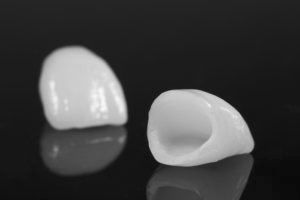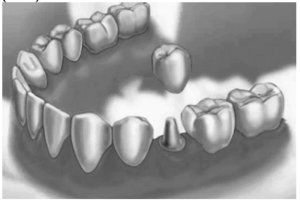Dental issues are widespread and can result in pain and discomfort. They can range from cavities, gum disease, and tooth decay to more severe dental conditions that require root canal treatment or dental implants. Various factors, including poor dental hygiene, genetics, diet, and lifestyle choices, can contribute to dental issues. Preventive measures are critical to reducing the risk of developing oral health problems. Regular visits to a dentist for check-ups and cleanings are essential for maintaining good oral health. It is crucial to seek professional help as soon as you experience any symptoms of dental issues, such as pain or sensitivity in your teeth.
With today’s technology, dental restorations have become more convenient. Most dental issues can be quickly treated by a dentist in your local area. Among the most common dental restorations are crowns, which are used to replace damaged or missing teeth.
Restorative Dental Crowns

As teeth deteriorate due to decay, infection, or fracture, they may eventually be unable to withstand regular use without the risk of further damage. Restorative dental crowns can be an effective solution for restoring the health and function of such teeth. They provide a layer of protection to damaged or decayed teeth, guarding them against further trauma. Dental crowns can also be used to restore the appearance of teeth, giving them a natural look and feel. Additionally, they can help enhance the overall health of your mouth by reducing bacteria growth and preventing further damage from occurring. Crowns are a restorative option that preserves tooth function for years.
If you are searching for a reliable dental office to get dental crowns in Indianapolis, East Indy Dental Care is the ideal choice.
What is a Crown?
Dental crowns, also known as caps, cover the entire visible part of a tooth surface above the gum line. They are designed to resemble neighboring teeth so that they restore both form and aesthetics. Whether you need a temporary crown or a permanent crown, East Indy Dental Care uses durable, high-grade materials that resemble natural tooth enamel for our ceramic, metal, or porcelain crowns.
Ceramic crown
A ceramic crown is a type of dental crown that involves using a ceramic material to restore damaged or decayed teeth. This type of crown provides a durable and natural-looking solution for restoring teeth affected by injury or disease. With proper care, ceramic crowns can last up to 15 years. Additionally, they are biocompatible, which means they will not trigger an allergic reaction in the body. Ceramic crowns can replace old metal crowns and hold dental bridges between missing or broken teeth. You can also use them to conceal a discolored tooth.
When Is It Necessary to Get Dental Crowns for Your Teeth?
Dental issues like a cracked or broken tooth due to teeth grinding or other circumstances can be resolved with dental restorations. Dental crowns are a common dental restoration that can be used to repair and strengthen teeth that have been damaged, decayed, or weakened. Typically, dental crowns are used when a tooth is too weak to support a filling or the tooth needs to be restored to its original shape and size. They can also be used for cosmetic purposes, such as changing the color or shape of a tooth, as they look like natural teeth. It is essential to know when it is necessary to get a dental crown to ensure that your teeth remain healthy and strong for years to come.
Some of the most common reasons a tooth may need a crown include:
- Teeth that have been treated with a root canal
- Large, failing restorations
- Fractured enamel
- Trauma
- Deep, severe decay
Porcelain Crowns
At our Indianapolis dental office, we commonly use porcelain for dental crowns. Porcelain serves a cosmetic purpose and makes the dental crown functional. Whether it is a front tooth or any other teeth, the restoration will be both durable and beautiful, as it has a natural appearance similar to your real teeth.
East Indy Dental Care offers high-quality porcelain fused crowns designed to withstand normal biting and chewing functions. Our custom-matched porcelain materials are made to resemble your natural teeth, ensuring a seamless and attractive appearance. If you need dental assistance, please do not hesitate to contact us today to schedule an appointment at our Indianapolis dentist office.
Cost of Crown Treatments
Many people avoid getting dental treatment because of the cost. Our Indianapolis dental crowns protect your tooth so that you don’t need more expensive treatments later on. If you carry dental insurance, we can apply those coverage amounts toward your dental crown treatment.
For amounts left over that may not be covered by insurance, or for Indianapolis patients who do not have dental coverage – we invite you to check out our flexible financing options. Our Indianapolis dental office makes financing your crown easy to do. Make affordable monthly payments and get fast approval, so that your smile needs are not put off before it is too late.
Your Comfort During Treatment Is Important to Us
All dental crown treatments begin with numbing the tooth to avoid discomfort or sensitivity. Our Indianapolis office also offers nitrous oxide and sedation dentistry to help you relax. Ask us about your options at your next appointment!
The Crown Procedure

Dental crowns are a widely used dental procedure that helps restore teeth that have been damaged by decay or trauma. They serve many purposes, such as supporting dental bridges, covering dental implants, protecting weak teeth, and correcting irregular bites. By restoring the shape, size, and strength of the teeth, dental crowns help maintain good oral health.
Dental bridges are a common dental restoration method used to replace missing teeth. Typically, they are composed of two or more dental crowns fused together and placed over the gaps left by a missing tooth or teeth. The crowns serve as anchors, holding the bridge in place and providing a stable, natural-looking substitute for a missing tooth. Different materials, such as porcelain, metal alloys, and zirconia, are used to create dental bridges. They are designed to match the shape, size, and color of your existing teeth, ensuring that they blend in seamlessly with your smile.
A dental crown procedure involves several steps:
- The decayed portion of the damaged tooth is removed, and the tooth is reshaped to ensure a proper fit for the crown.
- The dentist takes an impression of the prepared tooth to create a customized crown made from porcelain or metal.
- The customized crown is placed over the prepared tooth and securely attached with a strong adhesive.
During your dental crown treatment, we will remove any damaged tooth structure, reshape the tooth, and then take an impression the lab uses to create a customized restoration. The crown is ready to be bonded over the tooth in about two weeks.
This procedure results in a restored, natural-looking smile that can last many years with proper care and maintenance. With today’s advanced technology, it is possible to get high-quality dental crowns that look like natural teeth in one visit with minimal discomfort or downtime.
Properly cared-for crowns can last for many years. If you suspect your tooth needs a crown, call East Indy Dental Care. You may also contact us to inquire about same-day crowns or to schedule an appointment if it has been more than six months since your last exam and cleaning.
Schedule a Dental Appointment at East Indy Dental Care
We aim to provide you with proper dental services at East Indy Dental Care. Taking care of your oral health is vital for your overall well-being, which is why regular dental appointments are essential to maintain healthy teeth and gums and avoid further dental issues that may occur. Dental crowns can support dental bridges, cover dental implants, and restore the appearance and function of damaged teeth, making it even more important to attend regular dental appointments.
We have compiled some frequently asked questions about dental crowns to help answer popular questions.
